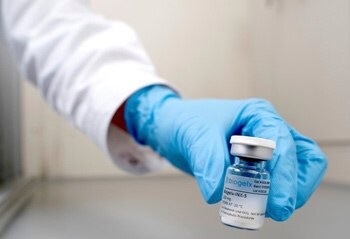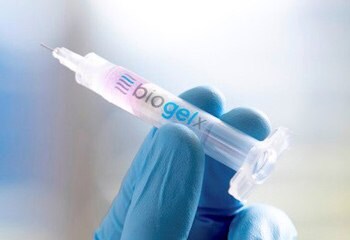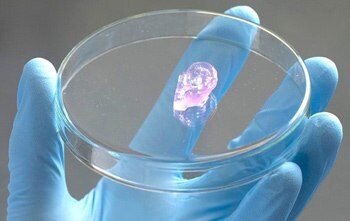Biogelx™ self-assembling, non-animal-derived peptide products have rapidly gained a global reputation in the fields of 2D and 3D cell culture applications. The materials’ unique ability to emulate specific physical properties of a wide range of tissue types offers new opportunities for developing complex 3D models for biomedical and pharmaceutical applications.

Biogelx™-INKs are supplied as a lyophilised peptide powder, to be rehydrated with a preparation solution and cell culture media. (Pic©Creatific)
BIOGELX™-INK TECHNOLOGY

Save time with easy-to-prepare Biogelx™ Inks. (Pic©Creatific)

Perfection in printing. (Pic©Creatific)
Biogelx™-INK materials use the company’s proprietary self-assembling peptide hydrogel technology, but have been developed with a focus on printability. Like Biogelx™ synthetic hydrogels, the bioinks form a nanofibrous network, mimicking the extracellular matrix, which can support cell growth, signaling, and proliferation. Additionally, they have been developed to offer optimal rheological properties for bioprinting by extrusion-based printing methods. This ensures that Biogelx™-INKs provide both cell viability and printability. The bioink materials can be tailored to specific applications, thus they have a huge potential in various fields, including cellular applications, toxicology, drug screening, and regenerative medicine.
KEY PRODUCT FEATURES
- REPRODUCIBLE: Like our hydrogel range, our bioinks are produced synthetically in our ISO 9001:2015 certified laboratories and are therefore non-animal derived. This ensures batch-to-batch reproducibility, which in turn guarantees consistent prints.
- EASY TO HANDLE: The addition of cell culture media triggers gelation. There is no requirement for extreme temperatures, pH adjustment, UV curing, or addition of reactive crosslinking reagents, which can be detrimental to cells’ health.
- TUNABLE: Like our hydrogels,1,2 the opportunity to tailor biomimetic functionality to specific cell types is also available for our bioinks (Biogelx™-INK-S, Biogelx™-INK-RGD, Biogelx™-INK-GFOGER). The Biogelx™-INK range has been optimized for extrusion-based printing methods; however, it is also possible to prepare lower viscosity formulations for alternative printing techniques.
- PRINTABLE: Biogelx™-INKs are printable at room temperature to provide a self-supporting structure that can then be further cross-linked by adding excess cell culture media to form a final gel. The inks are shear-thinning, which can reduce the shear stress experienced by cells during the printing process.
- BIOCOMPATIBLE: Our products are made of short peptides which cooperatively assemble to provide a nanoscale structure that mimics the extracellular matrix of native tissues.1,2 The Biogelx™-INK product range includes formulations that incorporate a range of biomimetic peptide sequences, enhancing the biocompatibility of the materials with various cell types.

HANDLING AND USE OF BIOGELX™-INKs
Biogelx™ peptide bioinks are very easy to handle. They are provided as a lyophilized peptide powder and a preparation solution which, when combined with cell culture media, can be used to prepare the final bioink formulation. The products are prepared at mild temperatures (4-37°C) and neutral pH, and printed at room temperature. The inks do not require pH adjustment, UV curing, or addition of reactive cross-linking reagents, which can be detrimental to the health of cells. Thanks to their easy-to-use format, the bioink powders are stable for one year, providing customers with no waste.
Additional References
Pour continuer à lire, veuillez vous connecter à votre compte ou en créer un.
Vous n'avez pas de compte ?